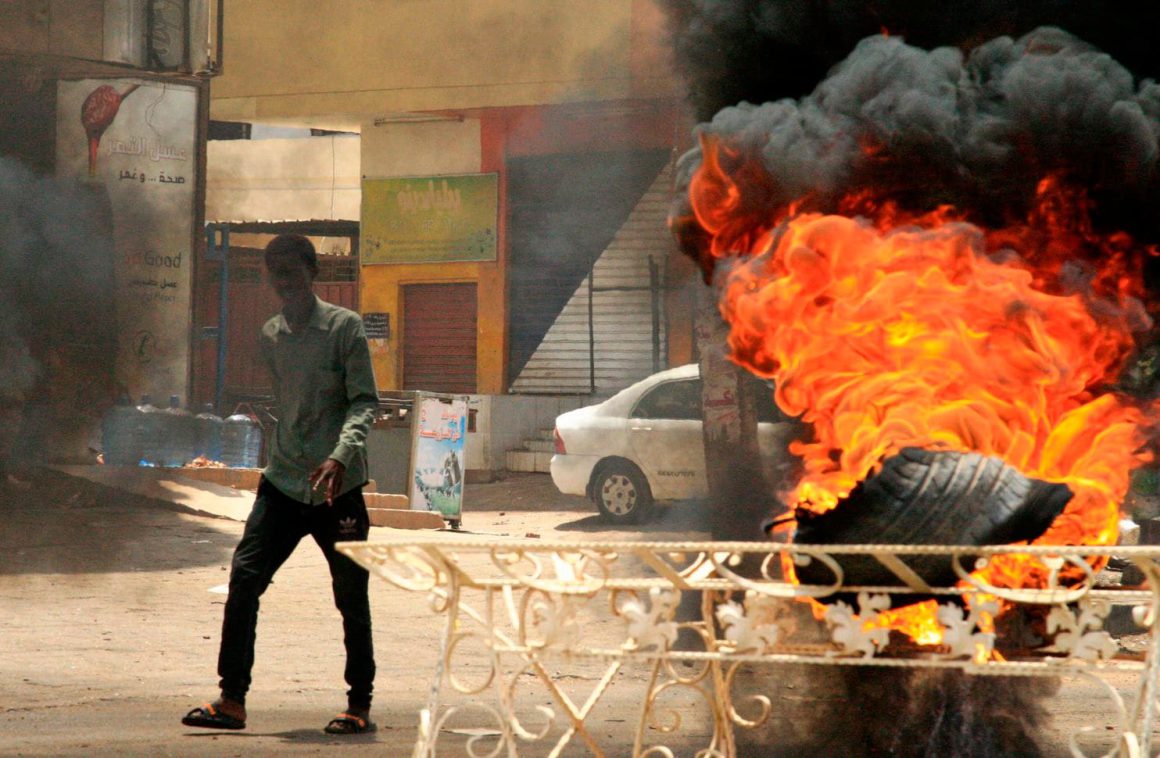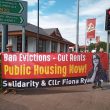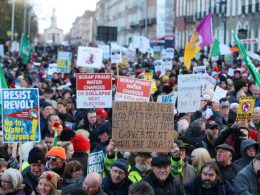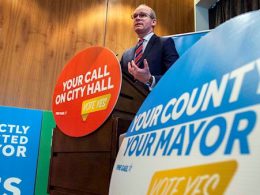By Serge Jordan, Committee for a Workers’ International (the international socialist organisation the Socialist Party in Ireland is affiliated to)
On Monday June 3 before dawn, the military regime and its thugs brutally dispersed the sit-in which had been camping outside the military headquarters in Sudan’s capital Khartoum since April 6, and which had served as the focal point for the ongoing uprising that brought down long-time dictatorial President Omar al-Bashir.
This counter-revolutionary move was carried out by security forces and an array of reactionary militias, in particular the so-called ‘Rapid Support Forces’ (RSF). These violent paramilitary troops were officially established in 2013 to become al-Bashir’s praetorian guard. They are offspring of the tribal Janjaweed militia, who built a notorious reputation through mass killings, rapes, lootings and countless other atrocities during the war in Darfur more than a decade ago.
Importing these methods straight into the heart of the capital, the RSF militiamen went on a murderous rampage across the city, torching the tents at the sit-in, raping women, shaving the heads of protestors with razors, flogging them with whips, chasing, beating up and mugging unarmed civilians in the streets, shooting live ammunition in hospital wards, looting shops…Similar violence, although on a smaller scale, was unleashed in Port Sudan, Sinar, Atbara and many other places. Video footages on social media are bearing witness to the ongoing violence used by the RSF, in Khartoum and other cities.
The Sudanese Doctors’ Committee has put the provisional death toll at over a hundred people, to be added to the many hundreds injured. It is likely, however, that the real figure for Monday’s bloody crackdown is much higher. A credible intelligence source with connections to the security apparatus reported to a Sudanese journalist that “some people were beaten to death and thrown in the Nile, some shot multiple times and thrown in the Nile and others were hacked with machetes and thrown in the Nile. It was a massacre.” Since then, about 40 bodies of dead protesters have been pulled out of the river.
Fear of revolution
Through this barbaric repression, the military junta who usurped power after the fall of al-Bashir tried to instil terror among the masses and to strike a serious blow to the revolutionary struggle that has shaken the country since December 2018. The use of rape, for example, is aimed at crushing the spirit of resistance of the many Sudanese women who have invariably been at the first line of the revolutionary mobilisations, and played a key role in braving the humiliations the old regime visited upon them.
Before Monday’s crackdown, the head of the so-called ‘Transitional Military Council’ (TMC), General Abdel Fattah al-Burhan, and his deputy General Mohamed Hamdan Dagalo, leader of the RSF, visited Cairo, Riyadh and Abu Dhabi. This was presumably to receive the green light, assistance and advices of al-Sisi, the butcher of the Egyptian revolution, and of the reactionary monarchs in the Gulf, the main regional backers of the TMC, for Monday’s murderous onslaught. All are dreaming of restoring a ruthless dictatorship in Khartoum that could drown the Sudanese revolution in blood, put to sleep any revolutionary temptations that might develop in their own backyards, and carry on with providing them cannon fodder for their war in Yemen.
The timing of these dramatic events is indeed not fortuitous. The inspiring revolutionary struggle of the Sudanese masses reached last week a new dimension with a solid two-day general strike which brought the country to a complete halt. The success of that strike, displaying the huge potential power of the working class, clearly frightened the generals and the possessing classes across the region. Among other things, the revolution has brought a new spur of life into independent working class activity, with the rebuilding of independent unions that were once destroyed by al-Bashir’s regime. Workers had started showing they would be a serious social force to reckon with, and that they could threaten the whole edifice upon which the junta’s political and economic power is erected.
Unfortunately, there was a lack of decisive leadership as to what to do after the two days of general strike, which had left the power of the generals hanging in the air. Immediately after the end of the general strike, the military rulers mounted a counter-offensive, deciding to strike at the revolution’s most iconic and vibrant expression. The leaders of the TMC stated that the sit-in had become a threat to “the security of the country” and had to stop. Pro-regime media went into a frenzy to denounce the peaceful sit-in as a nest of drug smugglers, debauchery and petty banditry, in an attempt to justify its dispersal and the subsequent massacre.
The old regime remnants and their international backers meticulously planned their operation. The offices of Al Jazeera in Khartoum were shut down on May 31, and its journalists banned from reporting from Sudan. To restrict further coverage, Internet was then shut down nationwide on Monday – and has not been restored since. Regular army units were consigned to their barracks and many of them were stripped of their weapons so that they could not obstruct the dirty job carried out by the RSF mercenaries. Scenes were later reported of soldiers sobbing helplessly as the carnage was unfolding.
This contrasts with the crocodile tears shed by Western governments, which cannot make up for their staggering hypocrisy. The EU has pumped millions into the RSF over the years to curb migration from Sudan to Europe. The White House and many European governments have propped up and supplied the Saudi regime with the weapons that have been used to gun down protesters and other innocent civilians in Sudan’s streets.
No more negotiations with the bloodthirsty generals
The political lessons of what happened need to be fully drawn, to make sure that the blood of the martyrs of June 3 and of the subsequent days has not been spilled in vain. Before this episode occurred, the CWI and its supporters in Sudan had been consistently arguing against the illusion of concluding a compromise with the old regime generals, who had grabbed power by force for the very sake of cutting the revolutionary flood in its track.
A statement by Socialist Alternative Sudan on May 23 explained: “Why should a revolution that got rid of Al Bashir through the sweat, tears and blood of our people end up negotiating a power-sharing arrangement with part of the oppressive apparatus that protected and benefited from his rule for so long? There is no way the military rulers have any intention to relinquish power, and they will not leave the scene unless they are compelled to do so by the force of mass revolutionary action – the only language they understand”.
Back in early April, the first reaction from the streets to the announcement of the creation of the TMC was the slogan: “The revolution has just started”, showing that many people were not prepared either to fall into the trap laid by the perpetrators of the military coup. Unfortunately, this was not so much the case for the leaders speaking on their behalf, organised in the Forces for the Declaration of Freedom and Change (FDFC), who accepted to negotiate with Al Bashir’s generals.
The FDFC is a broad opposition alliance whose spinning column is the Sudanese Professional Association (SPA, a network of professional unions which commands important authority among workers and grassroots activists for its organising role in the movement) but which also includes right-wing opposition parties embedded with the bourgeois Sudanese elite, like the National Umma Party and the Sudanese Congress Party.
These latter parties have a long legacy of making opening moves and concessions to Al-Bashir’s regime; they never trusted the mass movement, but wanted to ride it in order to access lucrative political careers in a future capitalist administration. Showing their true colours, the Umma Party leaders openly rejected the call for last week’s general strike. Now they have come out in support of the latest political manoeuvre of the TMC, the announcement of elections within nine months. Elections held under the current conditions, with the military and security clique in control, would yet obviously be nothing but an authoritarian masquerade.
By trying to pragmatically ensure the unity of the opposition under the leadership of the FDFC, the SPA leaders have mistakenly tied their hands to a dead-end strategy, trying to reconcile the demands of the revolutionary movement with the cynical ambitions of the counter-revolutionary military rulers. All SPA supporters should demand that the SPA now breaks ranks with all those pro-capitalist forces and leaders who would show any more readiness to strike a deal with the military butchers on the back of the revolutionary movement.
The FDFC negotiators thought they could appease the corrupt and brutal junta and convince them to adopt a more “reasonable” stand by sharing power in a hybrid sovereign body, composed of military and civilian representatives. Several weeks were wasted in fruitless back-and-forth negotiations with the TMC, throwing confusion in the movement and angering many activists. As many protesters were clearly aware, the generals sat at the negotiating table not for the sake of generously giving up their power, but in order to win time, fool the opposition with vague promises and wait for the right opportunity to resort to violence against the masses on the streets.
On Wednesday General Burhan made a televised speech in which he said the TMC was willing to resume negotiations. This call was made as its henchmen were firing, beating and killing in the streets, and hours before security forces arrested a prominent politician of the opposition, Yasir Arman, leader of the Sudanese People’s Liberation Movement North (SPLMN). The FDFC spokesmen have, rightly, stated that they would stop all political contact with the Military Council, and suspended the negotiations as they consider “the junta no longer eligible to negotiate with the Sudanese people”. But it never was before! From the very beginning, while under tremendous pressure from the mass movement, the TMC was nothing but the nerve centre of the counter-revolution, composed of notorious corrupt war criminals and old regime supporters, who sought to hijack a revolution that represented a direct threat to their brutal rule and their exploitative system. From their point of view, the removal of Al-Bashir and other top officials happened only to try and preserve the essential foundations of the old state machine and safeguard their own positions, out of which they derive important privileges and economic wealth.
Heroic resistance
Despite the extent of the regime’s violence, protesters driven out of the site on Monday outside the defence ministry displayed a heroic resistance, continuing to demonstrate, erecting barricades in the streets of Khartoum and the neighbouring city of Omdurman. In neighbourhoods throughout the capital, people poured onto the streets to protest the junta’s actions, barricading streets with bricks, burning tires, blocking bridges. On Tuesday, videos appeared on social media showing residents even performing Eid al-Fitr prayers behind their barricades.
According to a CWI supporter living in Khartoum, protesters barricaded most roads in the city as of Wednesday June 5, although some have since been removed by force. Fierce street battles regularly oppose angry youth to RSF patrols roaming around and terrorising people; gunfire continues to be heard and more killings are taking place. On Tuesday evening, security forces tried to break up Port Sudan’s sit-in in front of the 101st infantry division without being able to do so, while Port Sudan workers have continued acts of strikes and civil disobedience. Protestors closed most of the main roads and a number of neighbourhoods using roadblocks and tire fires.
On Tuesday, Wednesday and Thursday, angry marches, mass demonstrations and road blockades also erupted in various parts of the country as the extent of the massacres in Khartoum became clear. On Wednesday, mass demonstrations broke out in Zalingei in Central Darfur, El Geneina in West Darfur, and Nyala in South Darfur, braving tear gas and live bullets and chanting slogans demanding the fall of the military junta.
Sections of the working class have downed tools in protest to the military junta’s actions, as did the oil field workers in West Kordofan. On Monday, internal and external flights had stopped at Khartoum International Airport coinciding with the announcement by the Sudanese Pilots Association of an all-out civil disobedience without any exception to any flights. In reaction, regime militias have been forcing striking workers to work under threats on their lives. Airport workers who were on strike were visited at their home addresses and forced to go to work at gunpoint. One man who refused was shot in front of his family.
The threat of such brutal counter-revolution needs to be answered with mass, organised collective action and self-defence by the revolutionary masses. As militias are spreading terror, rape and slaughter, the organization of the physical defence of the revolution has become a life-or-death question. Defence committees should be set up in all workplaces, communities, and neighbourhoods, and link up with each other to coordinate their action, and centralise any weapon they can find, including makeshift ones.
The class divisions within the armed forces and the revolutionary sympathies that still prevail among many ordinary soldiers should also be acted upon without delay. After all, the looming mutiny in the lower ranks of the army was one of the key reasons behind the junta’s rush to get rid of Omar Al Bashir. Public calls should be made by the SPA and the revolutionary committees towards the rank-and-file soldiers and junior officers to refuse any orders coming from the military council, rebel against their commanders, democratically elect their own committees, and link up with the revolutionary people to help them hunt down and disarm all the militias, and arrest and try all the killers, rapists and torturers.
The calls by the SPA for a “complete civil disobedience; the closing of all main streets, bridges and ports; and an open political strike at all places of work and facilities, in the public and private sectors” are going in the right direction. Whereas the calls for this “comprehensive strike” have been made for starting on Sunday, there are signs of it developing already – although with the Eid holidays, it is difficult to evaluate the extent of this. In any case, the masses do not have the luxury to wait. Immediate and decisive action is required to defeat the counter-revolution’s current rampage. Barricades on the streets, strike actions with workers’ defence groups protecting the workplaces, occupations of strategic locations and infrastructure, are the way to go to paralyse the current offensive from the reactionary junta, its militias and security forces, and begin a decided revolutionary counter-offensive.
Down with the TMC – Power to the workers and the revolutionary people!
In the course of the revolutionary struggle, a far-reaching process of grassroots organization took shape in the communities and in the workplaces, in local areas and at the sit-in protests, in effect developing a situation of “dual power”: challenging the old state machine run by the generals and old regime remnants, appeared the embryos of a new society, in the form of various local revolutionary committees. With these local committees as a foundation unit, a new revolutionary state power could be built, that could give the challenge to the military clique in the TMC and its various appendages. Neighbourhood, strike and workplace committees, if generalised, could elect representatives to local, regional and nationwide councils, and vie for political power in the name of the revolution.
For such a struggle to mobilise the widest energies and support, it has to harness on its banner not only demands for a real democracy in Sudan; but also demands addressing the burning social and economic questions that are continuously subjecting the masses to daily suffering: the struggle for bread, jobs, decent wages, housing, land, access to education and healthcare, transport and social provisions. If argued consistently, such a program could even contribute to break the ranks amongst some of the most downtrodden and under-class youth being enrolled in the regime’s militias and currently weaponised to repress the movement.
Yet eventually these demands can only be fulfilled if the key sectors of the economy are taken off the hands of the corrupt military elite and of the domestic and foreign capitalist class, who are siphoning them for their own enrichment. As The Economist commented on April 27, “The junta has much to lose. An estimated 65%-70% of state spending goes on security, compared with just 5% for public health and education. Families connected to the military and security services run the businesses that dominate the Sudanese economy.” These businesses should be brought under public ownership, to be democratically planned and managed by the workers and the revolutionary masses.
A government of working people and poor farmers, implementing socialist policies, would put an end to the pillaging of the economy and the ocean of misery it brings along, and disarm the counter-revolution both politically and militarily. Appealing to the workers, poor and oppressed people of Africa and the Middle East to join the fight against capitalism and dictatorship, such a government would be a huge source of inspiration to the millions of people internationally watching with anxiety the unfolding battle between revolution and counter-revolution in Sudan.
As it is, the future of the Sudanese revolution is very uncertain. The political vacuum inherited from the absence of a mass party, that could unite the workers and the revolutionary people behind a clear program and show a decisive way forward, weighs heavily on the movement. Reports of tensions and clashes between the Sudan Armed Forces and the RSF indicate that the situation could get very messy, with elements of a civil war taking shape or even the possibility of a “coup within the coup”, or of more serious clashes between various armed factions and militias vying for control. However, the revolutionary movement has not pronounced its last words, and it is the duty of all socialists, trade unionists and left activists around the world to assist this struggle in any way they can to drive it to a successful outcome.
Our demands
-Immediate mobilization to the defence of the Sudanese revolution – for an all out, countrywide general strike against the coup council
-For the mass and democratically organised self-defence of the revolution. Build strike action and protection committees in all workplaces, streets and neighbourhoods. Disband and disarm the Rapid Support Forces and all the regime’s militias.
-Defend all democratic rights, release all political prisoners and people arrested in the last days.
-Bring down the military regime, arrest the TMC leaders – for a worker’s and poor’s government based on people’s committees.
-For the Sudanese people’s right to determine their own future – no to the meddling and intervention in Sudan’s affairs by international and regional powers.
-Scrap the military and security budgets – for a program of massive public investment in infrastructure, health, jobs and education
-Nationalisation under workers’ control of all the companies and assets belonging to old regime cronies, military and security officials
-International workers’ solidarity with the Sudanese revolution – no trust in the African Union, the European Union and other imperialist bodies and governments
-Down with capitalism, exploitation and war. Return all Sudanese troops from Yemen immediately.
-For a free, democratic and socialist Sudan, recognising the right of self-determination for all oppressed nationalities and ethnic groups












